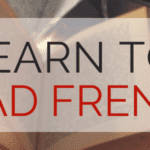
Those who have progressed past beginner French to an intermediate level should have learned basic everyday French vocabulary (such as common food items, animals, colors, numbers, and tourism-related words) and the present and past tense of the most common French verbs, especially avoir and être.
If you want to get to an intermediate level, the best way would be to concentrate on learning all of the common verb tenses, the most used grammatical structures (including pronoun placement) and expanding your vocabulary to 2,500-3,500 common words. Here are the main areas to focus on:
Techniques to Learn Intermediate French Grammar
The most effective way to learn French grammar at an intermediate level is to work through a comprehensive, advanced French book, and teach yourself the fundamentals of each grammar lesson, without going into depth in it. Then, as you approach an advanced level, you can teach yourself each concept in depth. Here are some major grammar concepts to focus on:
Verb Tenses
Learn all the common verb tenses. For past tense, you should know imparfait and passé composé and when to use each, along with plus-que-parfait. Also learn the conditionnel and futur tenses, as well as when to use each.
It’s also probably a good time to learn the subjunctive mood. The conjugations and usage are a bit harder to understand, but the subjunctive is used frequently in French, so it’s important to learn to use it as well.
Other Grammar Topics
Make sure you’ve got adverbs and indirect and direct object usage down, as well as negation.
How to Increase Your French Vocabulary
We cover many vocabulary lists on this site (our post on 87 vital verbs may be especially useful to ensure that you know them all), but an additional book or set of flashcards set is probably the most effective way to learn intermediate-level vocabulary.
- Searching for vocabulary and making your own lists in a topic that interests you is a good way to keep up your motivation to expand your vocabulary.
- Use either a French flashcard app online or buy or make your own flashcards to work on expanding your vocabulary. Most French learning books will teach you vocabulary as you progress in your lessons, or you can purchase a separate French vocabulary book to teach yourself.
- Another technique is to read through a French novel aimed at grade-school aged children and write down every word you don’t recognize, and make flashcards for them or a list of them to study off of.
Next Steps
You’re ready to begin reading articles and simple stories in French, and you should be able to understand bits of spoken French as well. Make sure to practice reading and listening to natural content written or spoken by native speakers in addition to content that was designed specifically to cover certain vocabulary words or grammar concepts for language learners. Your goal is to be able to communicate in a way that is natural as well as correct, and exposing yourself to actual conversations and writing is one of the best ways to become a truly well-rounded French student.



